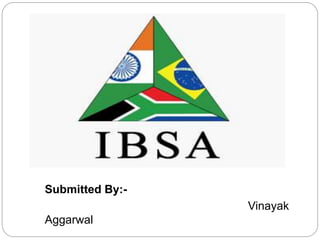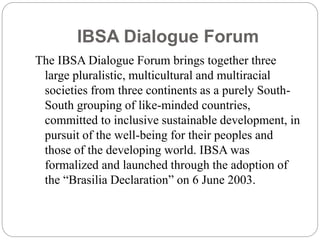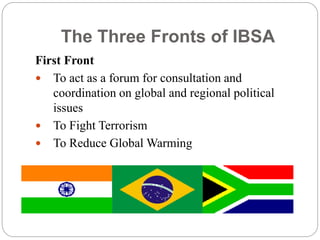Ibsa
- 2. IBSA Dialogue Forum The IBSA Dialogue Forum brings together three large pluralistic, multicultural and multiracial societies from three continents as a purely South- South grouping of like-minded countries, committed to inclusive sustainable development, in pursuit of the well-being for their peoples and those of the developing world. IBSA was formalized and launched through the adoption of the âBrasilia Declarationâ on 6 June 2003.
- 3. How IBSA Formed The idea of establishing IBSA was discussed at a meeting between the then Prime Minister of India and the then Presidents of Brazil and South Africa in Evian on 2 June 2003 on the margins of the G-8 Summit. The grouping was formalized and named the IBSA Dialogue Forum when the Foreign Ministers of the three countries met in Brasilia on 6 June 2003 and issued the Brasilia Declaration.
- 5. Objectives ïTo promote South-South cooperation ïFacilitate the trilateral exchange of information, technologies and skills ïPromotes the international poverty Alleviation and social development ïTo promote cooperation in broad range of areas such as:- Agriculture, Global Warming, Culture, Defense, Education, energy, health, information society etc.
- 6. The Three Fronts of IBSA First Front ï To act as a forum for consultation and coordination on global and regional political issues ï To Fight Terrorism ï To Reduce Global Warming
- 7. Second Front ï Trilateral collaboration on concrete areas/projects, through fourteen working groups and seven People- to-People Forums Third Front ï Assisting other developing countries by taking up their projects through IBSA Fund.
- 8. Organizational Structure Joint Working groups :- There are 14 joint working groups:- 1) Agriculture 2) Culture 3) Defense 4) Education 5) Energy 6) Environment 7) Health 8) Human Settlements 9) Transport and Infrastructure 10) Public Administration 11) Revenue Administration 12) Science and Technology and Information Society 13) Social Development 14) Trade and Investment and Tourism
- 9. People-to-People Fora There are seven People-to-People Forums under IBSA:- 1. Academic Forum 2. Business Forum 3. Tri-Nation Summit on Small Business 4. Editorâs Forum 5. Local Governance Forum 6. Parliamentary Forum 7. Womenâs Forum
- 10. Focal Points Senior Officials from the Foreign Offices of the three countries dealing with IBSA are the designated Focal Points; Secretary , assisted by Joint Secretary , Ministry of External Affairs, is the IBSA Focal Point for India. Focal Points meet once a year to discuss the progress.
- 11. Trilateral Commission The Brasilia Declaration established a Trilateral Commission at the level of Foreign Ministers. The Commission meets regularly; the first meeting of the Trilateral Commission was held in New Delhi on 4 - 5 March 2004. Foreign Ministers meet regularly before every IBSA Summit. Here is the list of all the trilateral meetings that has happened so far:-
- 12. ï 1st: March 5th, 2004, in New Delhi; ï 2nd: March 3rd, 2005, in Cape Town; ï 3rd: March 30th, 2006, in Rio de Janeiro; ï 4th: July 16th and 17th, 2007, in New Delhi; ï 5th: May 11th, 2008,in Somerset West; ï 6th: August 31st to September 1st, 2009, in BrasÃlia; ï 7th: March 8th, 2011, in New Delhi
- 14. Summits 5 summits have been held so far 1. In Brasilia on 13 September 2006 2. In South Africa on 17 October 2007 3. In New Delhi on 15 October 2008 4. In Brasilia on 15 April 2010 5. In Pretoria on 18 October 2011 The 6th summit was scheduled in New Delhi, India on 16 May 2013 but was cancelled and now the 7th summit is planned in 2017 in India.
- 15. IBSA Fund The IBSA Facility for Poverty and Hunger Alleviation (IBSA Fund) was established in March 2004 and became operational in 2006. It was established to help the other developing countries. Each IBSA country contributes U$ 1 million per year to the Fund. To date, the IBSA Fund has collected US$ 25 million and assigned US$ 21 million to projects in several countries. A total of 8 projects in six countries have been completed by the efforts of IBSA Fund and there are eleven ongoing projects in eight countries (Cape Verde, Cambodia, Guinea-Bissau, Guyana, Laos, Palestine, Sudan and Vietnam). At first the projects requested by different countries are reviewed and evaluated by the IBSA Board Of Directors on the following criteria :-
- 16. ï Reduction of poverty and hunger; ï National ownership and leadership; ï South-South cooperation; ï Use of IBSA country capacities; ï Strengthening local capacity; ï Ownership; ï Sustainability; ï Identifiable impact; ï Innovation Other Criteria: ï Timeframe ï Project size
- 17. Agreements and Memorandum Of Understanding(MoUs) Three Agreements and 17 MoUs have been signed for pursuing sectoral cooperation among IBSA countries.
- 18. Achievements ï In 2006, the IBSA Fund received the South-South Cooperation Award for Partnership from the United Nations Development Program (UNDP). ï In 2010, the âMillennium Development Goals Awardsâ, granted by the NGO âMillennium Development Goals Awards Committeeâ. ï In 2012, the IBSA Fund was awarded the "South- South and Triangular Cooperation Champions Award", from the United Nations Office for South- South Cooperation (UNOSSC). ï IBSA celebrated its 10th year anniversary in 2013. ï Up to the date IBSA has done trade worth of US$ 23 Billion and their next target is US$ 25 Billion in year.
- 19. Thank you


















